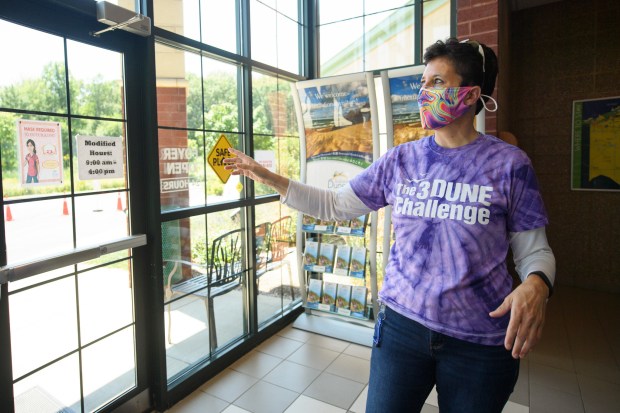Lorelei Weimer, the longtime executive director of Indiana Dunes Tourism, was one year into a three-year contract when she stepped back in January to pursue other interests.
The tourism board approved a settlement agreement for the remaining two years of her contract, as well as a retirement fund and other benefits, for about $220,000, according to Mitch Peters, president of the tourism board.
Peters had hoped to get the settlement on the agenda for the Porter County Council’s next meeting on March 26 with a request for a $225,000 appropriation but that plan has stalled as county officials think the matter requires an executive session, and it wouldn’t have made it onto the council agenda anyway.
The actual request, Peters said, was going to be a bit higher to make sure all of the costs were covered. Regardless, “this is the number that was approved by our board unanimously,” and he said he wouldn’t recommend anything that isn’t in the best interest of tourism and Porter County.
Council Vice President Red Stone, R-1, who is filling in for President Mike Brickner, R-At-large, is charged with setting the meeting as the interim council president.
“I’m not putting it on my meeting agenda, so that’s that,” Stone said, “which means it’s not being appropriated.”
Christine Livingston, vice president of IDT, took over as the agency’s interim president and CEO on Jan. 19, the day after the board approved her as interim director, while Weimer used up nine weeks of vacation time.
Weimer had been with the agency for 33 years, starting there as an intern after college. She led the agency for 22 years.
Indiana Dunes Tourism vice president Christine Livingston speaks during a celebration of the Indigenous Cultural Trail at the Indiana Dunes Visitor Center on Sept. 27, 2023. She has been named the organization’s interim president and CEO.
The tourism board put the cart before the horse by approving the amount, Stone said, adding the settlement is bound by a confidentiality agreement between Weimer and the tourism board.
“If they can’t discuss it with us, I’m not putting it on my agenda and voting on it,” he said. “Whether it’s a golden parachute or a settlement, I don’t know. I don’t know what the settlement is for and if I did, maybe it would change my mind.”
Approving the funds isn’t fair to taxpayers, he said, adding they would likely agree with him.
“If she had two years left, they could have left her (in the role) and said, ‘What’s going on here?’” he said, adding he objected to paying Weimer almost a quarter of a million dollars when, at their most recent council meeting, members couldn’t agree on a $14,500 lease for a new van for the coroner’s office.
At this point, the settlement is destined for an executive session, which officials said is the best venue for going over the matter.
“I think the solution would be to have an executive session prior to our regular meeting,” said Councilman Jeremy Rivas, D-2nd, who served as president until he was replaced by Stone in January.
As far as transparency about the settlement, Rivas said Stone, a former longtime member of the Duneland School Board, should understand the terms of confidentiality agreements for personnel matters. “There are just going to be some things we can’t discuss,” Rivas said.
The council has to consider the tourism board’s unanimous vote for the settlement.
“We have to take that into consideration, and I’m not sure what the alternative would be. Not backing the board’s settlement could bring a lawsuit,” Rivas said.
After an executive session, Rivas said, the council could determine whether to put the settlement on a meeting agenda and make a decision on whether to fund it.
“By not funding the settlement, that basically tells the board and the county that we’re letting it go to a lawsuit, which could substantially cost a lot more,” he said.

Lorelei Weimer, executive director of Indiana Dunes Tourism, points out measures the visitor center enacted to uphold the Hoosier Hospitality Promise during the COVID-19 pandemic on July 23, 2020. Weimer stepped back from her leadership role in January.
Board of Commissioners President Jim Biggs, R-North, said he spoke with two members of the tourism board about what to do.
“I made the recommendation that you need to call an executive session with the county council. The reason for that is, there’s a lot of misinformation out there,” he said.
His understanding is that the tourism board is going to set the closed-door meeting and invite the council.
“From my chair, I think it’s a terrible mess,” Biggs said.
He told members of the tourism board that they’re asking the council for $225,000 to buy out the contract for an employee he found out was resigning through a story in the Post-Tribune after that board approved a confidential settlement with her.
“Who in their right mind would do that?” he said, adding an executive session with county officials should have come first “before they agreed to do anything because at the end of the day, it’s not their decision. It’s the council’s decision.”
“That is a huge red flag to me — huge. It doesn’t get much bigger than that.”
The tourism board needs to make the case for the council to agree to the settlement, Biggs said, adding Weimer’s decision to resign “came as a huge surprise” to him and other elected officials, who didn’t know anything about it.
Additionally, Weimer is the only department head who had an employment contract, Biggs said, adding the others are all by appointment. She asked for a contract several years ago, he said, after the director of the South Shore Convention and Visitors Authority at the time made a play to take over Porter County’s tourism bureau as well.
“One thing I’m certain is, between commissioners and the council, we don’t have the whole story here,” he said, adding the tourism board agreed to pay out the settlement without consulting with the council first. “I think that’s terribly unfair.”





